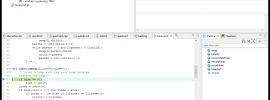In part one of this series, we took a first look at sets, a relatively new core data type in Python. In this article, we will continue cover set methods, as well as a new literal format for sets. In addition to expressions, the set object provides … [Continue reading]
Python Sets: Part One

One of the core Python data types that we did not mention in earlier articles that perhaps deserves some attention is the set. Sets are a recent addition to Python; they are neither mappings (dictionaries) nor sequences (strings, lists and typles). … [Continue reading]
Python Debugging: An Overview

At some point, one of your programs is likely to do something you did not expect it to do, and in such a scenario, you are going to have to debug your code. Fortunately, whether you are using the command line Python interpreter, the IDLE interface, … [Continue reading]
Classes and Inheritance: Part Two
In the previous article, we introduced Python classes, discussed some of their features, and some of the similarities and differences from C++ classes. In this article, we will use our knowledge of C++ classes to rewrite our hash functions as a … [Continue reading]
Classes and Inheritance: Part One
In the previous article, we introduced some hashing functions, but had to pass the number of buckets (numBuckets) to each function, which was not an ideal solution. In this article, we introduce a programming construct that will provide a better way … [Continue reading]
Hash Functions in Python
The efficient sorting algorithms presented in the previous articles all have their own advantages and drawbacks, and all of them - merge sort, heapsort, and quicksort - have an average complexity of O(n log n). Once a list has been sorted, it becomes … [Continue reading]
Python File I/O
In the previous articles, we covered quite a bit of rudimentary Python programming, but we haven't covered on of the most important elements of any programming language: the ability to perform file I/O. In this article, we will cover file operations, … [Continue reading]
Heapsort: Part Two
In the previous article, we introduced the heapsort algorithm and coded several helper functions in Python. In this article, we will finally code the heapsort function and test it on some input data. To recap, we already introduced the following … [Continue reading]
Heapsort: Part One
In the previous article, we applied the concept of recursion to implementing an efficient sorting algorithm (merge sort). In this article, we will apply our knowledge of Python to a different sorting algorithm: the … [Continue reading]

Recent Comments